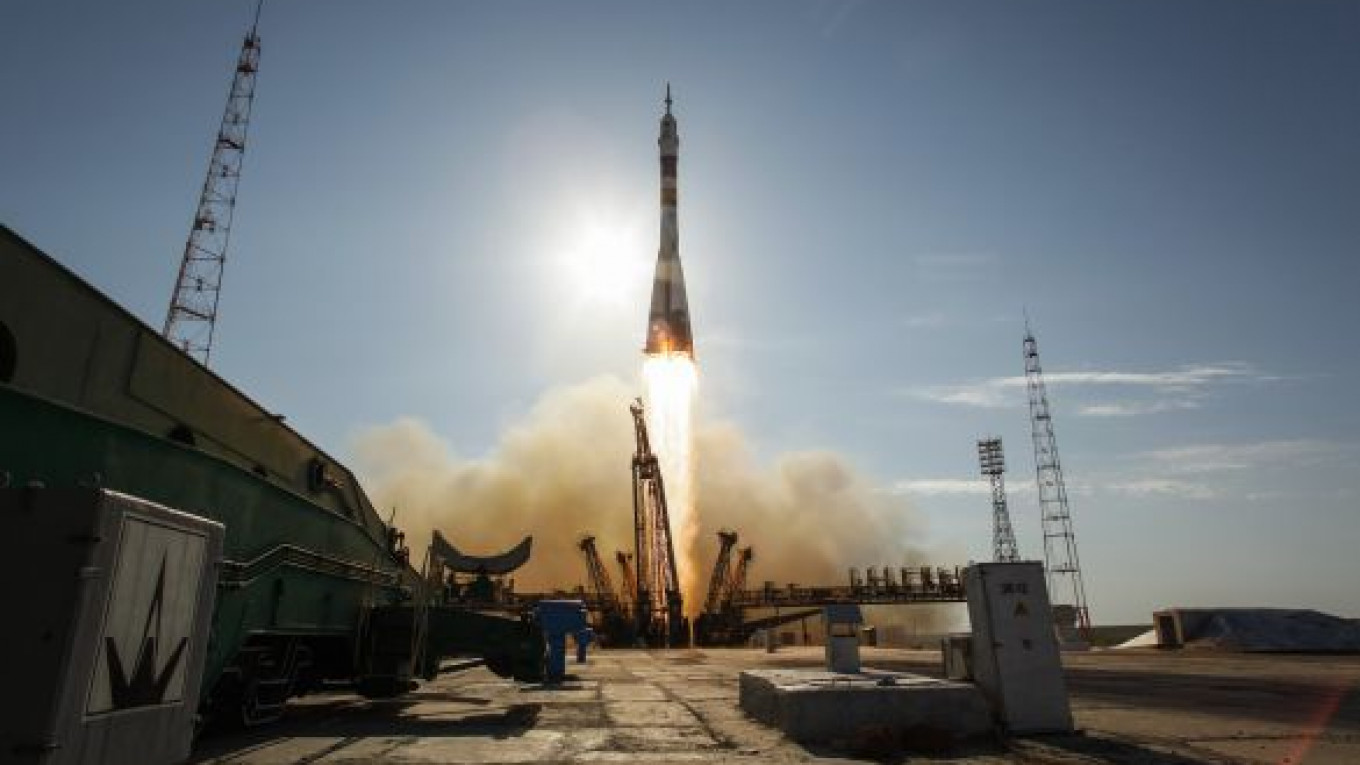Two Russians and an American blasted off in a Soyuz spaceship headed for the International Space Station Tuesday, overcoming more than a month's delay caused by problems with the Russian spacecraft.
Russian cosmonauts Gennady Padalka and Sergei Revin, along with American astronaut Joseph Acaba launched atop the Soyuz FG rocket at 7:01 a.m. Moscow time from Kazakhstan's Baikanur cosmodrome, soaring through clear skies to successfully reach orbit, RIA-Novosti reported.
The Soyuz TMA-04M capsule is scheduled to dock with the $100 billion research complex in orbit 385 kilometers above the earth Thursday morning at 8:39 Moscow time.
Padalka is making his fourth space flight as one of Russia's most experienced cosmonauts, with 585 days in space and eight spacewalks under his belt, while this is the first trip to space for Revin.
In remarks to reporters before the launch, Acaba said he would take a toy bear, Padalka an iPad and iPod, while Revin said he would have with him a toy kangaroo and small gifts for crew members who would celebrate birthdays at the station, RIA-Novosti reported.
The crew will carry out experiments in ecology and medicine during the trip, which will be shortened because of launch delays, and will also hold a lesson on ecology from space for school students.
The crew gave a thumbs up to an onboard camera three minutes into the flight, and Mission Control near Moscow told visiting scientists and students the three were feeling well, Reuters reported.
The newcomers will join Russian cosmonaut Oleg Kononenk and Dutch and American astronauts Andre Kuipers and Don Pettit, who have been at the station since Russia's last launch on Dec. 21.
Tuesday's launch, originally scheduled for March, faced more than a month of delays because of a problem with the hull of the Soyuz capsule that was caused during pressure tests.
The Federal Space Agency has faced a series of recent launch failures, including the crash of the unmanned Russian Progress cargo vessel that broke up in the atmosphere in August and the loss of a $170 million probe, whose engines failed to break it out of Earth orbit to begin its mission to the Martian moon Phobos.
After retiring its space shuttle fleet last year, the U.S. is now dependent on Russia as the only country able to shuttle astronauts to the space station, at the rate of $60 million per passenger.
Several private firms are seeking to get commercial space programs off the ground, including SpaceX, which hopes to launch its Dragon ship from Cape Canaveral to the space station May 19.
NASA has a video of Tuesday's launch.
A Message from The Moscow Times:
Dear readers,
We are facing unprecedented challenges. Russia's Prosecutor General's Office has designated The Moscow Times as an "undesirable" organization, criminalizing our work and putting our staff at risk of prosecution. This follows our earlier unjust labeling as a "foreign agent."
These actions are direct attempts to silence independent journalism in Russia. The authorities claim our work "discredits the decisions of the Russian leadership." We see things differently: we strive to provide accurate, unbiased reporting on Russia.
We, the journalists of The Moscow Times, refuse to be silenced. But to continue our work, we need your help.
Your support, no matter how small, makes a world of difference. If you can, please support us monthly starting from just $2. It's quick to set up, and every contribution makes a significant impact.
By supporting The Moscow Times, you're defending open, independent journalism in the face of repression. Thank you for standing with us.
Remind me later.






